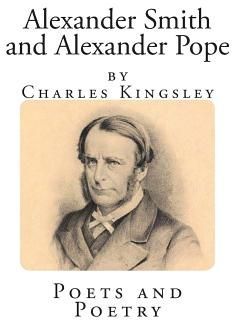Alexander Smith and Alexander Pope
by Charles Kingsley
Alexander Smith and Alexander Pope by Charles Kingsley. On reading this little book, and considering all the exaggerated praise and exaggerated blame which have been lavished on it, we could not help falling into many thoughts about the history of English poetry for the last forty years, and about its future destiny. Great poets, even true poets, are becoming more and more rare among us. There are those even who say that we have none; an assertion which, as long as Mr. Tennyson lives, we shall take the liberty of denying. But were he, which Heaven forbid, taken from us, whom have we to succeed him? And he, too, is rather a poet of the sunset than of the dawn - of the autumn than of the spring. His gorgeousness is that of the solemn and fading year; not of its youth, full of hope, freshness, gay and unconscious life. Like some stately hollyhock or dahlia of this month's gardens, he endures while all other flowers are dying; but all around is winter - a mild one, perhaps, wherein a few annuals or pretty field weeds still linger on; but, like all mild winters, especially prolific in fungi, which, too, are not without their gaudiness, even their beauty, although bred only from the decay of higher organisms, the plagiarists of the vegetable world. Such is poetry in England; while in America the case is not much better. What more enormous scope for new poetic thought than that which the New World gives? Yet the American poets, even the best of them, look lingeringly and longingly back to Europe and her legends; to her models, and not to the best of them - to her criticism, and not to the best of that - and bestow but a very small portion of such genius as they have on America and her new forms of life.
BUY NOW
Paperback, 38 pages
Published July 10th 2014 by Createspace Independent Publishing Platform
© 2025 Bibleportal.com 版权所有.

As a young man, Kingsley was influenced by The Kingdom of Christ (1838) by Frederick Denison Maurice. Originally intended for the legal profession, he changed his mind and chose to pursue a ministry in the church.
In 1850 Kingsley novel Alton Locke was published. The book attempted to expose the social injustice suffered by agricultural labourers and workers in the clothing trade. In Alton Locke Kingsley also describes the Chartist campaign that he was involved with in the 1840s.
Kingsley's life was written by his widow in 1877, entitled Charles Kingsley, his Letters and Memories of his Life, and presents a very touching and beautiful picture of her husband, but perhaps hardly does justice to his humour, his wit, his overflowing vitality and boyish fun.
Charles Kingsley was born in Holne (Devon), the son of a vicar. His brother, Henry Kingsley, also became a novelist. He spent his childhood in Clovelly, Devon and was educated at Magdalene College, Cambridge, before choosing to pursue a ministry in the church. From 1844, he was rector of Eversley in Hampshire, and in 1860, he was appointed Regius Professor of Modern History at the University of Cambridge.
Kingsley's interest in history spilled over into his writings, which include The Heroes (1856), a children's book about Greek mythology, and several historical novels, of which the best known are Hypatia (1853), Hereward the Wake (1865), and Westward Ho! (1855).
In 1872 Kingsley accepted the Presidency of the Birmingham and Midland Institute and became its 19th President.
Kingsley died in 1875 and was buried in St Mary's Churchyard in Eversley.
... Show more